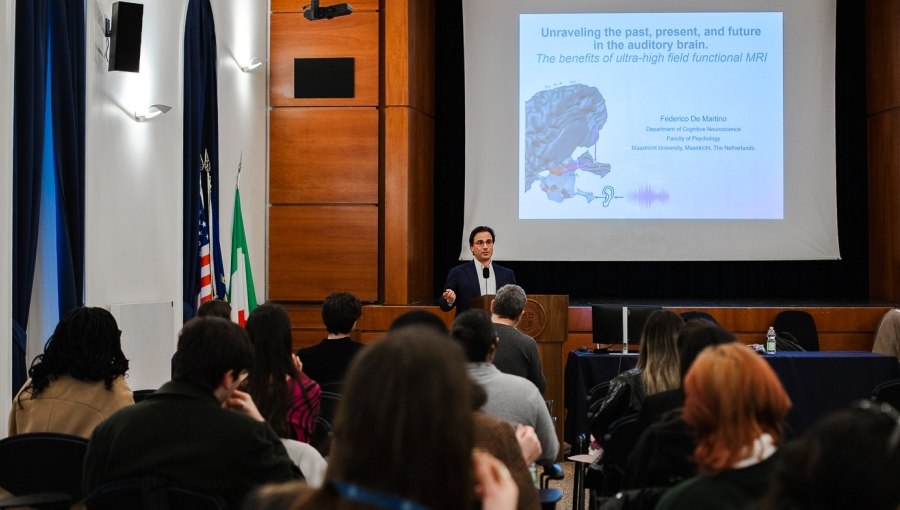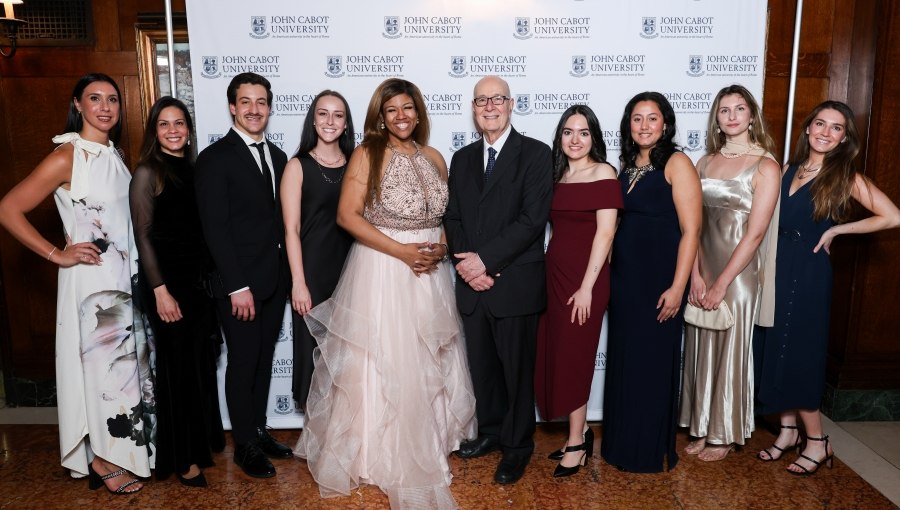JCU Announces Spring 2024 Triggering Change Competition Winners
John Cabot University is pleased to announce the winners of the Spring 2024 Triggering Change Competition. Triggering Change is a two-minute pitch that can be done individually or in pairs, and that aims to develop creative solutions that inspire action on sustainability. This semester, the competition focused on the UN Sustainable Development Goal (SDG) 5 (Gender Equality) and 11 (Sustainable Communities and Cities). The winning and finalist pitches demonstrated creativity and provided interesting solutions to the challenges posed by these two SDGs.

Winners
Jane Morrison (USC Transfer Applicant)
Jane proposed an app that measures our environmental footprint throughout the day and can help us make choices that lead a more sustainable life.
“Triggering Change has taught me to reassess my daily habits through a sustainable lens. Despite visiting a multitude of cities while abroad, it wasn’t until this competition that I fully comprehended the underlying consequences of urban transportation. Guided by the insights of our two wonderful SDG speakers, I learned that we are all called to be sustainable innovators; it is a collective multidisciplinary effort that can yield powerful and tangible results.”
Watch Jane’s pitch.
Ekaterina Forakis (University of Delaware) and Olivia Strom (Marquette University)
Olivia and Ekaterina addressed the waste of clothes and household goods that cohorts of visiting students leave behind at the end of each semester, and suggested selling these used objects to incoming visiting students.
“Thanks to this pitch, I have learned that students can make a huge contribution to their communities through seemingly small actions. By donating to the proposed ‘Move-In Market’ rather than throwing those things away, students minimize their carbon footprint and help those in need in their local or study abroad communities,” said Ekaterina.
“Our deep dive into the heart of our community’s issues to create a targeted solution to impact more sustainable cities and communities through our pitch has been a source of enlightenment. The collaborative efforts to enhance sustainability within the John Cabot and study abroad communities have not only shifted my perspective but also empowered me. I now perceive my tangible impact in driving sustainable development forward, and everyone’s ability to effect genuine change, added Olivia.
Watch Ekaterina and Olivia’s pitch.
Finalists
Sofia Espinosa (John Cabot University)
Sofia used the mixed technique of video and drawing to propose the idea of creating food forests as a way of providing sustainable agricultural food solutions to communities.
“This competition taught me a lot about how opportunities for change are within reach. Going into it, I knew I wanted to focus on food, as there are many inequalities in the food systems. This topic is essential to me, as I am Mexican, and there is a large concentration of Latinos in the farming, fishing, and forestry industries. I’m excited to see a cultural shift in regenerative techniques, such as the permaculture principles used for food forests.
Creating these food systems would allow for freedom among all people,” said Sofia.
Watch Sofia’s pitch.
Lucas Versey and Divina Amor Griego (John Cabot University)
Divina and Lucas addressed the problem of CO2 emissions and pollution in cities, and the dangerous effects on our health. They proposed to add green areas in cities (and even at John Cabot University) to make them more sustainable and healthy.
“Growing up in a rural area of southwest Minnesota, air quality never really crossed my mind. After moving to Rome and visiting cities around Europe the problem of air pollution became very prominent to me. The trigging change pitch allowed me to do my own research and learn about ways we can create cleaner air for our cities,” said Lucas.
“Joining the Triggering Change Competition increased my awareness about climate change, especially how we can reduce our carbon footprint. After the competition, I understood that positive impact can be easily made in an innovative and creative way, but mostly with a simple and affordable idea,” added Divina.
Watch Lucas and Divina’s pitch.
Lily Spencer (Texas Christian University) and Polly Geiger (University of Delaware)
Polly and Lily suggested a way for hotels in the U.S. to limit their electricity use and lower their emissions. They were inspired by the technique commonly found in European hotels, where electricity is switched on in rooms by inserting an electronic key, allowing electricity to be shut off when customers leave the room.
“Through the experience of creating our Triggering Change pitch, I learned a significant amount of information about SDG 11. My teammate, Polly, and I were able to create a pitch that proposed the United States use a more sustainable approach to electricity in hotel rooms, especially in top tourist destinations such as New York City, Miami, and Los Angeles. Overall, this was an extremely enriching experience and I am thankful to have had this opportunity!” said Lily.
“I learned a lot through the Triggering Change pitch, looking more into sustainable cities. My teammate Lily and I were able to do extensive research about sustainable cities and what we can do to help these communities. We looked into giving hotels in top tourist destinations a solution to using less electricity. I am grateful for this opportunity to learn more about sustainability and what we can do as a society to help,” added Polly.
Watch Lily and Polly’s pitch.
Congratulations to all!
Learn more about sustainability at JCU.





